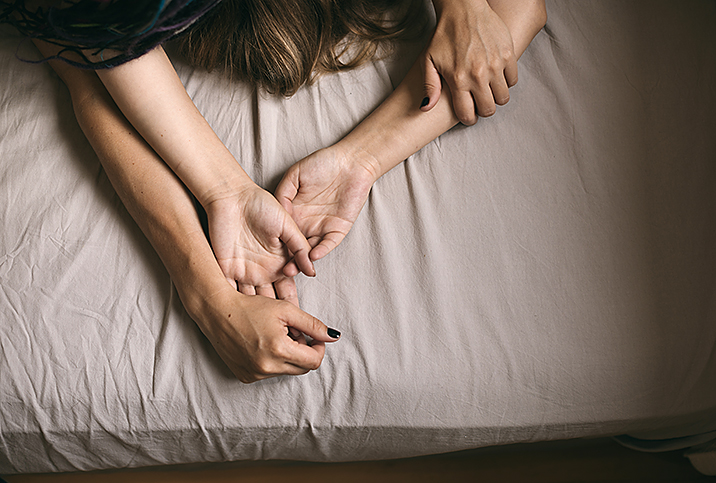How Does Endometriosis Surgery Impact Sex?

Desiree Lindsey, 28, kept getting sick during her period. The Las Vegas fashion entrepreneur's nausea had become so crippling at work that she was unable to hold down food and would spend most of the time in the bathroom.
"It got to the point where I'd have pillows, step stools, my laptop and chargers with me in the bathroom, just in case," she said.
In addition to abdominal cramping, intense pain during sex can occur when endometrial tissue in the uterus is irritated during penetration. This is the reality of endometriosis, a disease that doctors confirmed Lindsey had in 2016. The condition—which affects approximately 6 million people in the United States—causes tissue to grow outside the uterus, where it implants onto organs in the abdomen.
Lindsey said even before her official diagnosis, sex was always been painful for her. The same year she was diagnosed, she underwent a laparoscopy, a procedure that examines the pelvic organs and removes endometrial scar tissue with minor excisions.
Although some patients see a significant decrease in discomfort during intercourse after a laparoscopy, others report a change in desire, which can influence natural lubrication and result in dyspareunia, or pain during sex.
Changes in body image, emotional factors and physical pain can occur after any surgery and may affect sexual function as well. Lindsey's post-surgery symptoms—such as abdominal cramping—worsened in the next few months. As a result, she began to experience a physical and mental disconnect between her body and sex.
"I was super in my head about being different and having cysts," she said, "which made sex a little harder" after her laparoscopy.
Why endometriosis surgery?
Medication, hormone therapy and birth control are approaches often recommended for patients dealing with side effects such as painful intercourse or difficulty conceiving. Surgery for endometriosis may be suggested, especially when pain medication doesn't cure the problem.
- Laparoscopy is a minimally invasive surgery where a doctor uses a small camera to find and remove as much endometriosis tissue as possible from organs. Full recovery typically takes about two weeks.
- Laparotomy is a rare and major abdominal surgery that uses larger incision sizes, approximately 15 to 20 centimeters long, below the bikini line. This type of surgery is required if your endometriosis has spread to other organs and requires larger areas of removal. Healing takes longer and can last up to six weeks.
- Hysterectomy is used to treat severe endometriosis and removes the uterus and possibly the cervix, ovaries and fallopian tubes. The Walking Egg Foundation said that hysterectomies are 85 percent effective in preventing endometriosis symptoms. If the ovaries are removed, postsurgery sex may be more difficult due to premenopausal symptoms that lead to vaginal dryness. Healing takes approximately four to six weeks.
Most people with endometriosis won't have just one procedure, either. Within five years, scar tissue will need to be removed once again. A 2017 study at the Royal College of Obstetricians & Gynecologists found that 60 percent of people diagnosed with endometriosis require multiple surgical procedures. Two years after surgery, endometriosis symptoms return in 40 to 80 percent of patients, according to the American College of Obstetricians and Gynecologists.
Does intercourse or intimacy after surgery hurt?
For roughly two weeks after a laparoscopy, patients can expect to experience mild vaginal bleeding, soreness in the abdomen, irritation around the incision, mood swings and gas. Regular activities should be avoided for a week, and resuming sex will take at least two weeks. But after proper healing, most patients should be able to have a healthy, pain-free sex life.
Dr. Kenneth Barron, an OB-GYN in Charlottesville, Virginia, explained that vaginal intercourse after endometriosis surgery is different for every patient.
"If there are no other issues that are contributing to painful intercourse, I usually have patients wait two weeks before testing the water," he said. "If surgery was extensive, it might take longer to heal."
Lindsey said that although sex may sometimes be uncomfortable, she knows what she wants it to look like. "We try different positions and different types of foreplay to learn what I need to make sex more enjoyable," she said. Lindsey advised people to find a partner who isn't turned off or scared when you communicate that you're experiencing discomfort. It takes openness and a willingness to try bedroom alternatives (including toys, switching positions or sensual massages) to achieve pain-free intercourse after surgery.
Netherlands-based sex and intimacy coach Irene Fehr explained, "There is much stigma around painful sex that keeps women tolerating pain for extended periods of time because it requires speaking up. And speaking up is vulnerable and scary."
Discomfort during sex can lead to a lack of confidence and self-esteem.
"Combined with facing this alone, women begin to feel isolated and hopeless, which can create additional mental health challenges," she said.
If sex hurts postsurgery (or any other time), don't continue or push through. Focus on your body and pay attention to what feels good and what doesn't. Make sure to rest, avoid strenuous movements, take time to heal and drink plenty of fluids during recovery.
Begin a conversation about sex after surgery.
If you're dealing with pain, chatting with your partner is essential.
- Discuss sex outside the bedroom. Both partners can feel safe and relaxed, rather than feeling pressure to perform. Ideally, discuss sex before surgery to plan for any future challenges that are both mental and physical.
- Fehr encouraged people to "experiment and make mistakes." A journey after surgery isn't always an easy feat. "Fear of making a mistake prevents people from trying new things, which is the only solution here," she said.
- Chat with a therapist or sex coach about pain, anxiety or loss of libido due to surgery.
Ultimately, sex with endometriosis post-surgery may look different for every person. You might not be able to bounce back as fast as you'd like. Be patient. Fehr said, "It's about finding compassion for your body, rather than blame; coming towards it to meet it rather than pushing it away."


















